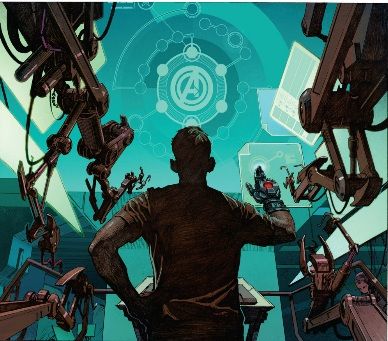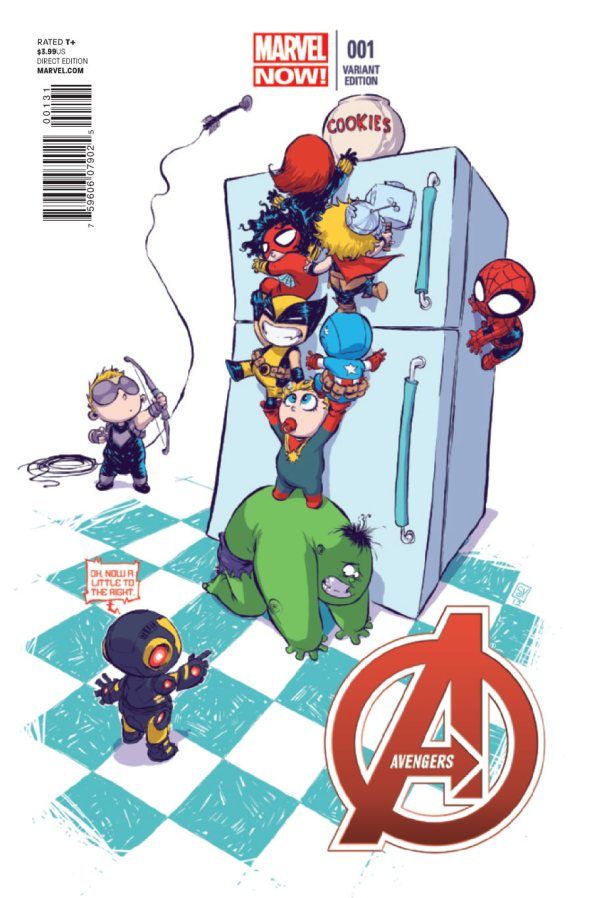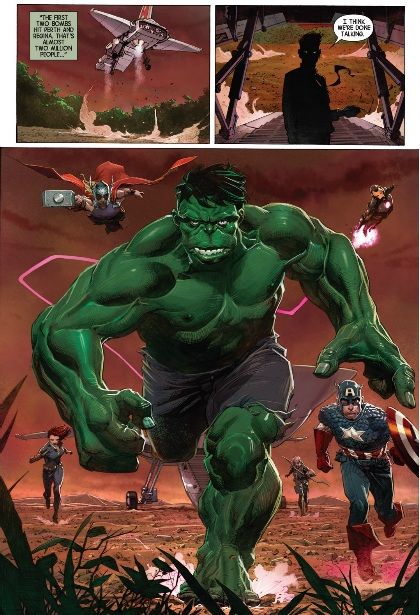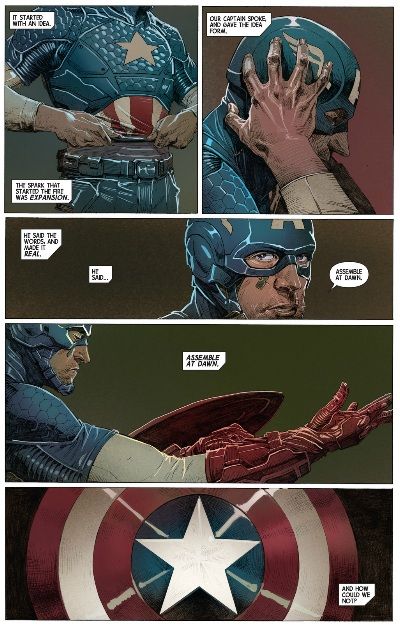Marvel NOW! is not half bad! In fact, from this new vantage point where we've mostly seen the first major debuts roll out through November, I can say that it's a bigger success than the Heroic Age. There's been some significant changes to theme and tone of our superheroes while still leaving continuity intact and everyone recognizable to the public. Everything that happened in the past few months of comics has carried over into the NOW!, we're just looking at it with a new style, a fresh coat of paint and, of course, oodles of variant covers.
Story styles and artistic choices come and go, and while we might love a particular run or artist team, we have to adapt and move into more modern and evolving ideas for the Marvel Universe. Sure, I'm not too on board with the upcoming Guardians of the Galaxy series because I really enjoyed their previous iteration, but if you look at the last series, it was a far cry from what it was when it started. Why not give the new book a chance and see if it can hook me in all over again? Losing Peter Parker as Spider-Man (for a while) is a big deal, but why not watch just to see how Dan Slott pulls this whole thing off? Change is good is what I'm trying to say, and Marvel NOW!, while still essentially the same heroes and villains we know and love, is also a lot of change.
It's weird to think that Brian Michael Bendis pretty much set the Avengers for the modern era. Yes, great storytellers had come before to establish what we all know and love about Earth's Mightiest Heroes, but Bendis really did blow all that up and rebuilt Marvel's premier super-team from the ground up. From Stark Tower to the essential leadership of Captain America and Iron Man to who's on the roster and why, to endless, endless lunches, most new comic readers know of the Avengers through Bendis' work. He's the man who made us read the book, for better or for worse and for six years, he's been the bottom line in Earth's Mightiest Heroism. It's a really tough act to follow, but if anyone is going to make us say "Bendis who?" in the next few months, it's Jonathan Hickman. Starting from the first issue (on sale this week!), there's a stage being set that will change the way we view the Avengers and their place in the grand scheme of the universe.
But who are the Avengers? What does it mean to join their ranks? How is it that, within the confines of a single issue, we've learned the essential secret to this new NOW! series? Click on, Dear Reader, and I will explain.
WARNING: I'll be talking about the contents of Avengers #1, but you still probably want to read Avengers #1 and see for yourself if any of my theories match up. So grab a copy and read along!
First things first: If a comic can't tell you what its purpose is with the first issue, I'm not sure it's worth reading. There's a lot you can't do with a first issue, and I understand the need to save it for the (hopefully) multitudes of issues that follow, but there should at least be a sense of purpose that will intrigue readers enough to get Issue 2. We're learning a lot about our Marvel heroes with Marvel NOW! as situations and motivations change across multiple first issues, but on the whole we should have an idea of where all these people are going. Thor is eternal and locked in combat through the ages, there's your Thor: God of Thunder. Bruce Banner is sick of his lot in life and is going to rope S.H.I.E.L.D. into helping him change it, there's the Indestructible Hulk. Captain America considers his personal place in the future then is trapped on a world created by an old enemy. We could go on. Sure, readers chooses their own purpose to the book they're reading as they interpret the story, but there should be something to grasp on to so that the audience can make those conjectures. No matter what, that first issue should tell you something that informs you about Issue 2 and beyond.
I think, in a very epic and intellectual fashion, Hickman gave us room to realize what being an Avenger means. Let's face it, there are a lot of books that are going to have the Avengers name on them. Teams of every flavor are going to be the "Adjective'"Avengers, just as putting an X in front of a team name makes it a book about mutants doing something. So what does it mean to be an Avenger (besides being highly marketable)? How does the one book that doesn't have a descriptor in the title describe itself as the standard?
Well, considering how many Avengers teams there are going to be, maybe it's just the new name for a super-heroic team. After all, the new story arc is called "Avengers World." Maybe we're all Avengers and we just didn't get our I.D. card in the mail yet. That would be awesome, but the Avengers have to remain more than just a superhero club. After all, we'll have other teams like the Fearless Defenders that won't be officially Avengers when united, plus there are all those X-Teams scattered far and wide. If anything, the Avengers are a specific type of superhero team and that defines them further.
Let's go with their byline and say that being an Avenger means you are one of Earth's Mightiest Heroes. When you have a Norse god on your side, why not define yourself by being the best of the best? Again, I think we could go a little further on this one. Everyone on the Avengers isn't a god nor are they particularly defined by the stats on the back of their trading cards. If we are going to say Avengers equals mighty, then where would that leave the other Avengers teams? Would some be secretly mighty? Or mighty under an age limit? No one's saying that the Avengers aren't strong (and yes Hulk, you're the strongest one there is), but their strength allows them to do what they do, rather than represent the reason they've banded together.
If you're both mighty and in a group, then you're responsible for more, so let's say that the Avengers are a team of the mightiest superheroes that protect the globe. It puts both of the above into use and gives them a target and theme to their efforts: Protect Earth. Except for the times they go into space. Well, you could say that getting involved in interstellar conflicts just protects our interests at home, but S.H.I.E.L.D. protects globally as well. Sure, they don't have 'International' in their name like the old days, but Strategic Hazard Intervention Espionage Logistics Directorate doesn't specifically relegate them to just the U.S.A. S.H.I.E.L.D. has superheroes under their employ, so what's the difference between being an Avenger and being a S.H.I.E.L.D. agent? There has to be something more than just bureaucracy.
We haven't even started to talk about Captain America yet, as he's been an essential member of the Avengers at key moments. During Bendis' run, people were made Avengers by Rogers Mandate and people took being brought in by Captain America very seriously. In this week's Avengers #1, the same holds true as Cap puts out an all call to Avengers recruits worldwide. What is it about Captain America that makes an Avenger? Not all Avengers are Americans, so I don't think it's the title. I think it's something about Steve Rogers himself that embodies what it means to be an Avenger, something all the rest of Earth's mightiest share, like a philosophy. A driving purpose, an ideal that everyone is working towards.
It's not patriotism; like I said, not all Avengers are American or even from this planet. Its more than just heroism as there are Avengers with criminal records or even methods of problem-solving that are less than noble. It's even more than just being 'good', as comics can't avoid the shades of grey that permeate modern society.
If it's anything, it's altruism.
Captain America, at heart, took the Super-Soldier serum, put on a costume and punched Nazis to protect those who couldn't. He had a deep desire to join the military to stop injustice, protecting people weaker than the evils they faced. For goodness' sake, his symbol is a shield! This is where I think we'll find Hickman's Avengers; as a group of mighty heroes dedicated to protecting those weaker than themselves.
It's why Tony Stark has the grand idea of getting bigger as an organization. It's how Black Widow and Hawkeye can go to Mars and stand toe to toe with whoever opposes them. It's why gods and aliens are looking out for us. It makes the word 'mighty' into more than just a power set and says a lot about the protected as well as the protectors. A book with the core ideal of altruism might be a rough sell, but when you can enliven that idea in space battles and powered armor and Norse gods, it's like putting cheese on your broccoli Watching as Avengers #1 unfold page after page, the scope was so large all I could think of is 'Why?'. Why does this team continue to assemble? What makes a hero answer Captain America's call? Why is his call so legendary?
It's because Steve Rogers is the human embodiment of altruism and if you answer that call, that means you have a little of that ideal inside of you. It makes you a better hero and a better person, something as a reader I can look up to. Whatever happens in Hickman's Avengers, we know that they will face dangers and disasters to protect those who can't and, in a way, that brings the reader into the book as well. We live in an Avengers World.




